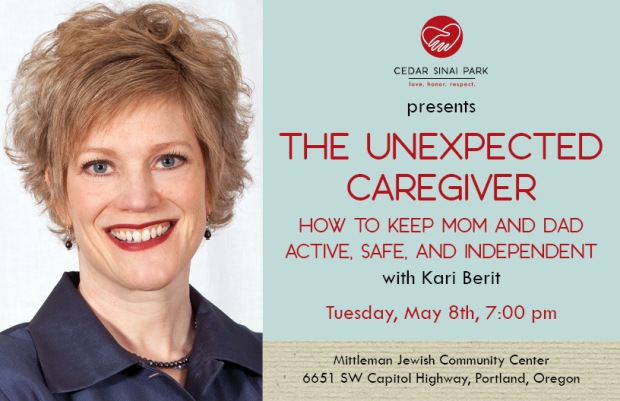Guest Post: Unpacking the Family Baggage in Caregiving
May 2, 2012 Leave a comment
In the run-up to Kari Berit’s May 8 lecture at the MJCC, “The Unexpected Caregiver: How to Keep Mom and Dad Active, Safe, and Independent” (details), we’ll bring you a series of articles by Kari about caregiving.
Today, “Unpacking the Family Baggage in Caregiving“ by Kari Berit.
No one can jump on another person like a family member can. It’s raw emotion, full of stale, unresolved baggage. It falls on you like a ton of bricks. When it comes to giving care to an aging parent, why should we believe it will be different? If you’re lucky, you come from a Leave it to Beaver or Brady Bunch family, but reality is, even those TV-land families had issues off set. Sometimes we’re lucky enough to have magic fairy dust sprinkled over families and they get along beautifully during family caregiving…that is a blessing indeed. But what about the families who can’t pull it together, have ups and downs, feel guilt-ridden about their parents’ end of life care?
5 Tips for Families Taking Care of Family
#1: Be aware.
Remember the family baggage? The unresolved issues from the past you’ve neatly swept under the proverbial carpet? Once you start down the road of caring for an aging parent, the carpet takes flight and the baggage is exposed. Siblings don’t magically step up to the plate. Brothers and sisters who fought before, will fight again. Be aware of this. Maybe it’s time to check back in with your therapist? Don’t have one: get one. A caregiver coach can help. You will revisit issues from the past. Stay alert.
#2: Put yourself on the gentle cycle.
Now is the time to get that massage, take a long walk, cuddle with your dog. Take care of yourself. Family caregiving brings a family back together under intense circumstances. You simply must be kind to yourself, which may translate to others as being selfish. Stay true to yourself. Keep your good, best friends on speed dial when you need a quick and supportive message of love.
#3: Walk away.
Hard as it may be, you may have to excuse yourself from the family. Just because someone needs care, doesn’t mean you have to expose yourself to bad behavior by others. This is not easy. But think of the family member who needs the care…they need calm rather than commotion. You may have to make peace with your role in this person’s life in your own way. Explore with a spiritual director, your pastor or best friend just how you can honor your loved one while taking care of yourself.
#4: Mom may not love you best.
Now is not the time to fight to be mom’s number one kid. It’s not personal. If mom trusts the brother you think is incapable of making all her financial decisions, you must let it go. This is not the time to prove to your mother that you’re really better with finances. There are reasons you mother trusts your brother, and that is just how it is. Unless he’s crooked, he’s your mom’s choice.
#5: It doesn’t have to be YOU.
Even though you promised your parents “you wouldn’t put them in a nursing home,” you didn’t promise that you, all by yourself, would take care of them. You may not be the right fit to change Dad’s diapers or feel Mom. Get help. You may have promised you’d care for them, but that is not the same as doing the hands-on-caregiving.
Kari Berit is a radio show host, speaker and the author of “The Unexpected Caregiver: How Boomers Can Keep Mom & Dad Active, Safe and Independent.” Follow her on Facebook!

